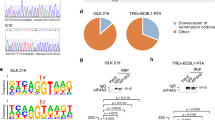
"Although Ku is critical in human cells, it is surprisingly dispensable for murine development, indicating a complex evolutionary role in DNA repair and immunity."
"Ku's interaction with double-stranded RNA may reveal a dose-sensitive mechanism that contributes to its essential function in human cellular contexts, beyond simple DNA repair."
The article discusses the essential role of the Ku complex (Ku70 and Ku80) in DNA repair through the non-homologous end-joining pathway, predominantly in human cells. Unlike mice, where Ku is redundant for development, human cells require it for functionality. The authors highlight the intriguing possibility that Ku's interaction with both double-stranded DNA (dsDNA) and double-stranded RNA (dsRNA) signifies a broader evolutionary role, allowing us to consider how Ku operates in the realm of innate immunity and genomic stability beyond mere DNA repair.
Read at www.nature.com
Unable to calculate read time
Collection
[
|
...
]